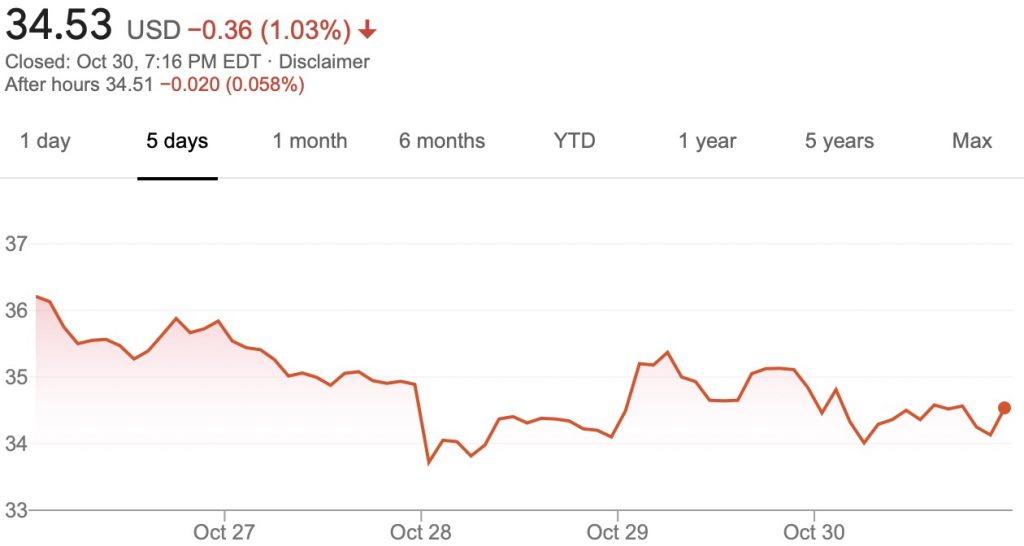GM Stock Value Down 6 Percent During Week Of October 26 – October 30, 2020
1Sponsored Links
The value of GM stock fell during the October 26th, 2020 to October 30th, 2020 timeframe. Shares closed the week at $34.53 per share, which represents a decrease of $2.30 per share, or more than 6 percent, compared to last week’s closing value of $36.83.
Movement & Ranges
| Date | Open | Close | High | Low |
|---|---|---|---|---|
| 2020/10/30 | 34.46 | 34.53 | 35.03 | 33.96 |
| 2020/10/29 | 34.51 | 34.89 | 35.66 | 34.36 |
| 2020/10/28 | 33.73 | 34.09 | 34.63 | 33.55 |
| 2020/10/27 | 35.55 | 34.89 | 35.86 | 34.75 |
| 2020/10/26 | 36.27 | 35.82 | 36.43 | 35.20 |
By comparison, shares of GM’s cross-town rival, the Ford Motor Company, fell $0.43 per share, or more than 5 percent, during the October 26th, 2020 to October 30th, 2020 timeframe. It’s worth mentioning the fact that The Blue Oval recorded a better U.S. sales performance during Q3 2020, beating out all three fellow domestic automakers: GM, FCA, and Tesla.
GM Stock Factors
Electric vehicle startup Lordstown Motors began publicly trading on the NASDAQ as “RIDE.” This may seem favorable to investors, as GM previously announced it would invest $75 million into the EV startup, including $25 million in cash, and $50 million in production plant assets permits. GM also appointed new personnel this week, with Paul Jacobson stepping in as the new executive Vice President and CFO.
It’s also worth noting that production of the C8 Corvette is back on track following a stop in production due to supplier constraints, marking the third “restart” of the new-generation sports coupe’s assembly line this year.
Additionally, General Motors president Mark Reuss confirmed that the automaker was still in discussions to form a partnership with Nikola, during a recent conference call with analysts. Notably, Nikola shares were up by 10 percent following the statement. GM has so far maintained its position regarding its strategic partnership with Nikola and the electric truck startup’s controversial woes.
Several weeks ago, we reported on GM’s agreement to repay $28M in state tax incentives as well as a renegotiation of the Nikola Motor Company deal, wherein The General would get an increased stake in the electric pickup truck startup. As reported, Nikola Motor Company shares fell following claims that company founder, Trevor Milton, overstated the startup’s tech capabilities, while GM held its ground and maintained its support of the agreement. Mr. Milton has since stepped down and the Securities and Exchange Commission and U.S. Department of Justice have begun their investigations. Currently, Nikola stock is valued at $18.31 per share, after reaching $50.05 on September 8th and falling to $17.88 on September 29th.
Other recent developments that may be influencing the value of GM stock include General Motors Ventures‘ new interest in Envisics, a U.K.-based startup developing augmented reality (AR) technology for automotive applications. GM believes the tech may find a place in the automaker’s up-and-coming all-electric vehicle models, such as the Cadillac Lyriq crossover. On a somewhat related note, The General and its autonomous driving subsidiary, Cruise, will soon apply for an exemption that will allow it to begin testing vehicles without a steering wheel or pedals on public roads in the United States.
The General recently provided a Q3 2020 economic and industry update following the release of its U.S. sales performance for the third quarter. Notably, all four GM brands in the U.S. (Buick, Cadillac, Chevrolet, GMC) saw sales declines, as did the rest of the industry. Large pickups, however, showed strength with heavy-duty year-over-year growth, while sales improved sequentially each month within the quarter, including a significant rebound in September with a year-over-year sales increase. All-new crossover models also gained sales momentum.
GM has also resumed construction at the site of its Canada McLaughlin Advanced Technology Track in Oshawa, Ontario after it was forced to postpone the project due to the COVID-19 pandemic.
Additionally, it seems some investors are banking on the expectation of a significant boost to stock prices following a spin-off for GM electric vehicle business. Notably, General Motors is working hard to introduce 20 new EV models by 2023. It’s also worth pointing out that the same can also be said for Ford, and such a trend would undoubtedly benefit another competitor as well, Tesla. More recently, the announcement of the GM-Honda alliance may also be of great significance to investors.
The optimistic projections followed GM’s plan to roll out an electrified portfolio, which includes an electric van, a Chevrolet EV pickup truck, the GMC Hummer EV as well as the Cadillac Lyriq, which was revealed in August and should have a starting price of under $60,000. Shortly before the reveal of the all-new GMC Hummer EV pickup truck on October 20th, GM stock prices were up 6.75 percent to $35.60 per share before continuing on to a weekly high of $38.03 on Friday morning, October 23rd.
Another consideration is the upcoming presidential election, which will lead to further market disruptions.
GM During COVID-19
The coronavirus pandemic initially forced GM to idle production across North America, South America and China as a result of the virus, putting the firm in a very unfavorable position. During such a scenario, any automaker – GM included – sees revenues fall sharply while rapidly burning through cash, resulting in a loss-making turn of events. Since the beginning of the pandemic, GM production in China has resumed, as did production across North America on May 18th.
GM has taken major steps to get through the COVID-19 pandemic, with the actions primarily revolving around fortifying its balance sheet. These moves entail reducing and/or deferring expenses, while shoring up cash and other forms of liquidity.
The General also had to cope with a small number of coronavirus cases at some of its facilities, including 22 confirmed cases at the Arlington Plant in Texas. Despite a high rate of worker absenteeism, GM has decided to keep the third shift at the Wentzville Assembly plant by relocating employees, after previously announcing that it would be cut. However, no major outbreaks have been officially reported so far.
GM Before COVID-19
It’s worth noting that GM share values were experiencing ongoing ups and downs since mid-2018, long before coronavirus complications, though shares never dipped to the levels observed in the first quarter of 2020.
For the most part, GM stock was in limbo throughout 2019, seeing a jump in value as a result of overwhelmingly positive Q2 2019 earnings, wherein the automaker outperformed expectations. Prior to the COVID-19 pandemic, several factors negatively impacted GM stock price during 2019, including:
- A UAW labor strike that lasted 40 days, resulting in no vehicles being built in the United States during that timeframe. Production was also idled in other countries as a result of supply chain-related issues caused by the UAW strike
- Warning signs of an economic slowdown
- Escalations with a trade war with China
Over the last few years, GM has taken many steps to increase the value of its stock, including exiting markets where it can’t find ways to turn a profit (such as Europe, South Africa and India), closing plants in various parts of the world, divesting loss-making divisions (such as Opel-Vauxhall), making adjustments to its business model in order to prioritize profitability over chasing market-share goals, focusing on its Cadillac luxury brand to increase its share of high-profit automobiles, investing heavily into new-age mobility ventures such as electric vehicles and autonomous driving tech, while discontinuing some sedans (Cruze, Sonic, Volt, Impala, Regal, LaCrosse, XTS, CT6) and closing various plants to focus on more profitable crossovers, SUVs and pickup trucks, such as the all-new 2021 Cadillac Escalade that was unveiled on February 4th.
Seeking to further minimize activities in unprofitable markets, General Motors also announced its intention to phase out the Holden brand in Australia and New Zealand, in addition to pulling the Chevrolet brand out of Thailand while selling the GM Rayong Manufacturing Complex to Great Wall Motors. In addition, GM recently announced its decision to shut down its Maven car-sharing service.
Despite these actions, the value of GM stock has historically struggled to surpass the $40 mark, spending most of its time in the $33-$38 per share range (prior to the COVID-19 pandemic). The chain of events is problematic given that the “new GM” had its Initial Public Offering (IPO) at $33 per share in November 2010, causing frustration upon many investors.
We remain interested in seeing how GM stock performs through the rest of 2020, especially following the COVID-19 crisis and upcoming 2020 presidential election.
Additionally, the refresh of many 2021 models will be delayed, including the Cadillac XT4, Chevrolet Traverse, Chevrolet Equinox, GMC Terrain, and Chevrolet Bolt EV. In fact, the overall roll-out plan for most GM products has been pushed back, which also includes the launch of the Cadillac CT4-V Blackwing and CT5-V Blackwing models.
That said, there are still some good things happening for GM in 2020, including market share gains and production increases for the Silverado and the Sierra during Q2 2020 as well as strong Chevrolet Blazer sales and Chevrolet Trailblazer sales. Notably, GMC Sierra inventory is extremely low as the automaker can’t build enough of them to meet strong demand. Most of GM’s range of redesigned full-size SUVs are now in stock on dealer lots, which includes the 2021 Chevrolet Tahoe and 2021 Suburban as well as the 2021 GMC Yukon and 2021 Yukon XL. Notably, regular production (SORP) for the 2021 Yukon diesel is set to kick off November 16th.
We’ll be here to report more as it happens, so be sure to subscribe to GM Authority for ongoing GM stock news and complete GM news coverage.























1 Comment